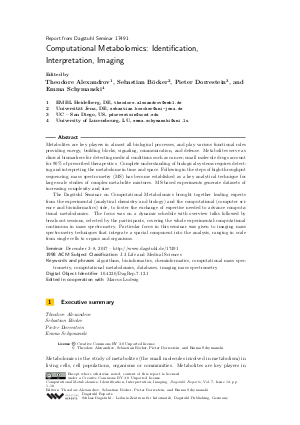Computational Metabolomics: Identification, Interpretation, Imaging (Dagstuhl Seminar 17491)
Authors Theodore Alexandrov, Sebastian Böcker, Pieter Dorrestein, Emma Schymanski and all authors of the abstracts in this report
-
Part of:
Issue:
Dagstuhl Reports, Volume 7, Issue 12
Part of: Volume: Dagstuhl Reports, Volume 7
Part of: Journal: Dagstuhl Reports (DagRep) - License:
 Creative Commons Attribution 3.0 Unported license
Creative Commons Attribution 3.0 Unported license
- Publication Date: 2018-04-09
File

PDF
DagRep.7.12.1.pdf
- Filesize: 2.87 MB
- 17 pages
Document Identifiers
Subject Classification
Keywords
- algorithms
- bioinformatics
- cheminformatics
- computational mass spectrometry
- computational metabolomics
- databases
- imaging mass spectrometry
Metrics
- Access Statistics
-
Total Accesses (updated on a weekly basis)
0PDF Downloads0Metadata Views
Abstract
Metabolites are key players in almost all biological processes, and play various functional roles providing energy, building blocks, signaling, communication, and defense. Metabolites serve as clinical biomarkers for detecting medical conditions such as cancer; small molecule drugs account for 90% of prescribed therapeutics. Complete understanding of biological systems requires detecting and interpreting the metabolome in time and space. Following in the steps of high-throughput sequencing, mass spectrometry (MS) has become established as a key analytical technique for large-scale studies of complex metabolite mixtures. MS-based experiments generate datasets of increasing complexity and size. The Dagstuhl Seminar on Computational Metabolomics brought together leading experts from the experimental (analytical chemistry and biology) and the computational (computer science and bioinformatics) side, to foster the exchange of expertise needed to advance computational metabolomics. The focus was on a dynamic schedule with overview talks followed by break-out sessions, selected by the participants, covering the whole experimental-computational continuum in mass spectrometry. Particular focus in this seminar was given to imaging mass spectrometry techniques that integrate a spacial component into the analysis, ranging in scale from single cells to organs and organisms.
Cite As Get BibTex
Theodore Alexandrov, Sebastian Böcker, Pieter Dorrestein, and Emma Schymanski. Computational Metabolomics: Identification, Interpretation, Imaging (Dagstuhl Seminar 17491). In Dagstuhl Reports, Volume 7, Issue 12, pp. 1-17, Schloss Dagstuhl – Leibniz-Zentrum für Informatik (2018)
https://doi.org/10.4230/DagRep.7.12.1
BibTex
@Article{alexandrov_et_al:DagRep.7.12.1,
author = {Alexandrov, Theodore and B\"{o}cker, Sebastian and Dorrestein, Pieter and Schymanski, Emma},
title = {{Computational Metabolomics: Identification, Interpretation, Imaging (Dagstuhl Seminar 17491)}},
pages = {1--17},
journal = {Dagstuhl Reports},
ISSN = {2192-5283},
year = {2018},
volume = {7},
number = {12},
editor = {Alexandrov, Theodore and B\"{o}cker, Sebastian and Dorrestein, Pieter and Schymanski, Emma},
publisher = {Schloss Dagstuhl -- Leibniz-Zentrum f{\"u}r Informatik},
address = {Dagstuhl, Germany},
URL = {https://drops.dagstuhl.de/entities/document/10.4230/DagRep.7.12.1},
URN = {urn:nbn:de:0030-drops-86740},
doi = {10.4230/DagRep.7.12.1},
annote = {Keywords: algorithms, bioinformatics, cheminformatics, computational mass spectrometry, computational metabolomics, databases, imaging mass spectrometry}
}
